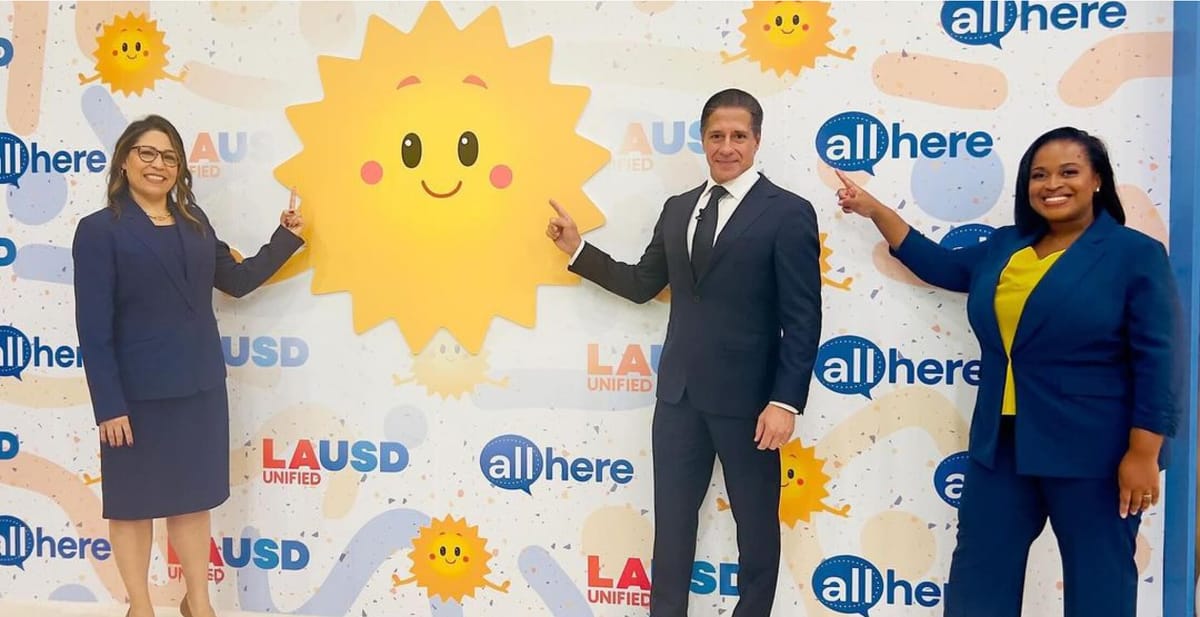
Los Angeles Unified School District (LAUSD) thought it was buying the future of education. Instead, it got a $6 million lesson in the dangers of AI illiteracy. Just three months after unveiling its AI chatbot "Ed," LAUSD's tech dreams have come crashing down. AllHere, the company behind Ed, has collapsed, leaving the district with a half-baked tool and serious questions about student data privacy.
AllHere's dramatic fall comes on the heels of numerous industry accolades. In April, TIME magazine named the company among the world's top edtech firms. That same month, Inc. Magazine lauded founder Joanna Smith-Griffin as a global K-12 education leader in artificial intelligence. Now, barely two months later, Smith-Griffin has left her role as CEO, and the company has furloughed most of its staff due to financial difficulties.
Joanna Smith-Griffin, Founder and CEO of AllHere, joins @LAUSDSup on stage as he delivers the keynote at @asugsvsummit on Unlocking the Potential of AI. With Ed, students receive personalized support to help them excel in school. #EdTech #NextGenEd pic.twitter.com/iU9xta3B8M
— allherek12 (@allherek12) April 15, 2024
The Boston-based startup, founded in 2016 by Harvard graduate and former teacher Smith-Griffin, had attracted $12 million in venture capital funding. Its flagship product for LAUSD was an AI-powered chatbot named "Ed," designed to serve as a "personal assistant" for students and families. LAUSD Superintendent Alberto Carvalho had championed the tool, calling its ability to know students "unprecedented in American public education" during an April conference.
LAUSD is the second largest school district in the country (behind New York City), and has an annual budget of $18 billion. Last June, they approved AllHere's $6.2 million contract (following a competitive bid process) to plan, design and develop Ed. I'm sure Smith-Griffin gave a good sales pitch and had the right buzzwords. Harvard grad. Former teacher. AI expert. It must've looked good on paper.
LAUSD, in its eagerness to jump on the AI bandwagon, handed millions to AllHere. This engagement was the initial part of a two-year agreement ending in July 2025, with options for three subsequent one-year renewals. Now the rapid unraveling of AllHere has undoubtedly cast a shadow over LAUSD's ambitious AI plans and the future of the project.
I don't have all the facts, and I don't know why AllHere ultimately imploded. Some have pointed to the company's small size and its inexperience working with projects of this scope. However, I believe the real issue is the apparent low AI literacy among leaders at LAUSD and their failure to seek expert guidance.
Think about it, for a fraction of the $2 million that was reportedly already paid to AllHere, LAUSD could have brought in AI consultants to educate its selection committee and guide its decision-making process. Instead, they dove headfirst into the deep end of AI, armed with nothing but buzzwords and misplaced confidence.
Maybe it was a failure to understand the fundamental limitations of current AI technology. Or perhaps it was sheer hubris. Whatever the reason, LAUSD's AI illiteracy led to a cascade of spectacularly poor decisions.
The district failed to grasp not just the complexities of AI development and deployment, but also the well-documented challenges inherent in large language models like the one powering their chatbot. These systems, while impressive, are known for their tendency to "hallucinate" - confidently generating false or misleading information. It's a problem that leading AI research labs like OpenAI and Google DeepMind haven't yet solved.
So why did LAUSD feel so confident in rolling out this technology across the entire district? Did they conduct a successful pilot program? If they did, they've been remarkably quiet about it. Even major tech companies label their AI solutions as experiments or beta versions, acknowledging the technology's current limitations. But LAUSD, blinded by AI hype, somehow convinced itself it could outpace even tech industry giants.
This reckless approach is especially alarming when it comes to handling sensitive student data. LAUSD didn't just fail to understand the AI - they failed to grasp the enormous responsibility they bear in protecting students' personal information. Former AllHere executive Chris Whiteley's allegations of data mishandling aren't just a technical hiccup - they're a damning indictment of LAUSD's cavalier attitude towards student privacy.
LAUSD's response to these allegations has been tepid at best. They've offered vague assurances about taking privacy "seriously," but seem more concerned with saving face than addressing the core issues. This from a district already grappling with two other data breaches this month. It's a pattern that suggests a systemic failure to understand and manage the risks of new technologies.
The victims in this debacle are the students and families of Los Angeles. They were promised a revolutionary tool to navigate the education system and augment the learning experience. Instead, they got a potential privacy nightmare and $2 million of taxpayer money down the drain.
The tech industry loves to throw around terms like "disruption" and "innovation." But when it comes to education, we need to be more careful. We have to do better. Our kids' futures – and their privacy – are at stake. It's not enough to throw money at the latest tech trend—especially when it comes to AI. School districts need to invest in understanding these technologies before they deploy them.
The lesson for other school districts is clear: before you jump on the AI bandwagon, make sure you know how to drive. Invest in AI literacy and bring in genuine experts – not just vendors with slick pitches – to guide your technology decisions. And always, always prioritize student privacy and security. The future of education may well involve AI, but it needs to be built on a foundation of knowledge and responsibility, not just hype and hope.

